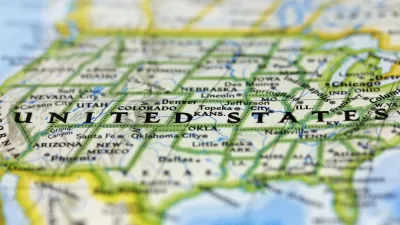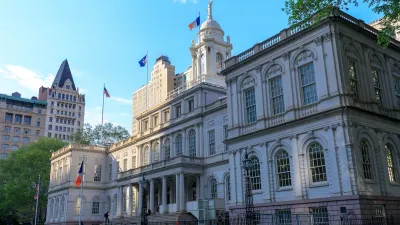Brookings illuminates which states rely heaviest on infrastructure for employment as local policymakers are struggling with reliable federal funding throughout the peak of construction season.
According to a recent post by Joseph Kane and Robert Puentes for Brookings Institute, "policymakers at the state level, in particular, are grappling with a series of infrastructure challenges given the looming shortfall in the Highway Trust Fund." To pay for needed improvements, some in the final stages of construction, states have started raising their gas taxes, turning to private funding, or supporting transportation ballot measures.
Indeed as, "more than 14.2 million infrastructure jobs are at stake in these policy discussions—the majority of which last for years beyond construction—it’s easy to see why states are acting with a sense of urgency." Taking a closer look at some of the states, California and Texas combined have about 2.7 million infrastructure jobs, based on massive trade and logistics facilities.
Moreover, when assessing the share of infrastructure jobs from total employment, "several states exceed the national average (11.0 percent), led by Alaska (15.1 percent), Wyoming (14.8 percent), North Dakota (14.4 percent), Tennessee (13.3 percent), and Louisiana (13.2 percent)."
While it is unclear in what capacity federal policymakers will be able to support infrastructure in the future, states are beginning to tackle these issues locally. These efforts, according to Kane and Puentes, are, "investing in our most fundamental physical assets, [and] they’re keeping millions of workers on the job."
FULL STORY: Ranking the Top States for Infrastructure Jobs

Alabama: Trump Terminates Settlements for Black Communities Harmed By Raw Sewage
Trump deemed the landmark civil rights agreement “illegal DEI and environmental justice policy.”

Planetizen Federal Action Tracker
A weekly monitor of how Trump’s orders and actions are impacting planners and planning in America.

Why Should We Subsidize Public Transportation?
Many public transit agencies face financial stress due to rising costs, declining fare revenue, and declining subsidies. Transit advocates must provide a strong business case for increasing public transit funding.

Understanding Road Diets
An explainer from Momentum highlights the advantages of reducing vehicle lanes in favor of more bike, transit, and pedestrian infrastructure.

New California Law Regulates Warehouse Pollution
A new law tightens building and emissions regulations for large distribution warehouses to mitigate air pollution and traffic in surrounding communities.

Phoenix Announces Opening Date for Light Rail Extension
The South Central extension will connect South Phoenix to downtown and other major hubs starting on June 7.
Urban Design for Planners 1: Software Tools
This six-course series explores essential urban design concepts using open source software and equips planners with the tools they need to participate fully in the urban design process.
Planning for Universal Design
Learn the tools for implementing Universal Design in planning regulations.
Caltrans
Smith Gee Studio
Institute for Housing and Urban Development Studies (IHS)
City of Grandview
Harvard GSD Executive Education
Toledo-Lucas County Plan Commissions
Salt Lake City
NYU Wagner Graduate School of Public Service





























